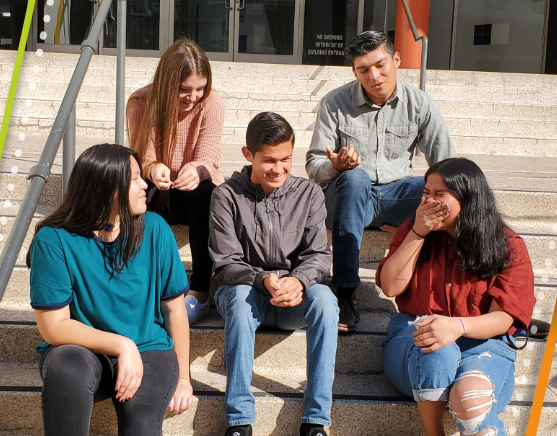About Us
RAND is a nonprofit institution that seeks to improve policy- and decision- making through research and analysis. RAND is committed to critical issues of particular relevance to the public policy debate, including health and health care.
Our team has worked with diverse young people for many years and we have found that the collaborative and nonjudgmental approach of MI supports young people in making healthy choices regarding substance use (alcohol, drugs) and, in the case of AWARE, sexual behaviors as well. The CHOICE, Free Talk, MICUNAY, and AWARE programs were developed using an extensive base of empirical work with young people as well as collaborations with community-based partners, parents, teachers, school administrators, service providers, and our Elder advisory board. Our hope is that these programs will provide facilitators with an effective way to talk with young people about health-related behaviors and offer strategies that will help them make positive choices now and in the future.
In keeping with RAND’s desire to disseminate findings as widely as possible to benefit the public good, the Group MI for Teens site offers training and materials free of charge to any interested party.
For more information about RAND, visit the organization’s
About RAND page
For questions about Group MI, CHOICE, Free Talk, MICUNAY, or AWARE contact our team at [email protected]







Students will come on a repeated basis to the program to be able to talk about things that they’re learning.
Tim Stowe, Ed.D.
Deputy Superintendent, Administrative Services
Torrance Unified School District
Elizabeth D’Amico, Ph.D., is a Senior Behavioral Scientist at RAND and a licensed clinical psychologist. Dr. D’Amico is nationally recognized for her work developing, implementing, and evaluating motivational interviewing (MI) interventions for young people. She is a member of the Motivational Interviewing Network of Trainers (MINT). Dr. D’Amico currently has several grants that evaluate MI interventions with young people in a variety of settings, including middle schools, primary care, teen court, homeless shelters, and with Native American young people in urban settings. She received her Ph.D. in clinical psychology from the University of Texas.
Carrie Johnson, Ph.D., Wahpeton Dakota, is a Licensed Clinical Psychologist and the Director of the Seven Generations Child and Family Counseling Center at United American Indian Involvement in Los Angeles, California. Dr. Johnson is involved with local, county-wide, and statewide advisory boards to increase the access to and cultural competence of services provided to Native Americans. Johnson also heads up the non-profit community-based agency, Sacred Path Indigenous Wellness Center (SPIWC). SPIWC provides support in conducting community-based participatory research in a culturally appropriate manner with American Indians and Alaska Natives (AI/ANs). Johnson collaborated with Dickerson and D’Amico on the MICUNAY project, engaging Native American organizations, and directing the recruitment of youth participants across California.
David J. Klein, M.S., Biometry, is a Statistical Associate at RAND. He has worked on a wide variety of research projects, mostly in the health field, and has extensive experience with statistical analysis of complex survey data, as well as claims, census, and other sources of data. Among others, his current and recent projects include studies on the evaluation of Medicare CAHPS survey data, discrimination and mistrust of health care, health disparities, adolescent risk behavior, quality and utilization of health care, use of paid family leave, and HIV medication adherence.
Sarah Hunter, Ph.D., is a Senior Behavioral Scientist at RAND and a Professor at the Pardee RAND Graduate School. Hunter’s primary areas of interest include improving substance use treatment quality; building community capacity to enhance prevention and treatment program delivery; and program evaluation. She has worked on several clinical trials implemented in real-world treatment settings, has studied implementation quality, and has assessed client outcomes.
Karen Chan Osilla, Ph.D., is an Associate Professor in Psychiatry and Behavioral Sciences at Stanford and a licensed clinical psychologist. She conducts health services research with a focus on delivering substance use services to underserved populations using innovative solutions that decrease health access disparities. Dr. Osilla has received funding from the National Institute on Drug Abuse (NIDA), National Institute on Alcohol Abuse and Alcoholism (NIAAA), and the Patient-Centered Outcomes Research Institute (PCORI). Dr. Osilla has been conducting addictions research since 2006 and has been involved in over a dozen clinical trials evaluating cognitive behavioral therapy, collaborative care, and motivational interviewing interventions (web and in-person) for mental health and substance use disorders among youth, adults, military, family members, and other hard-to-reach populations.
Joan Tucker, Ph.D., is a Senior Behavioral Scientist and Social Psychologist at RAND. Her work primarily focuses on substance use and sexual risk behavior among adolescents and young adults, with a particular focus on those experiencing homelessness. Dr. Tucker led the AWARE study, developing and evaluating a group MI intervention with 18–25-year-olds experiencing homelessness that aims to reduce substance use and sexual risk behavior. Her other work has focused on adapting and evaluating brief text messaging-based interventions to reduce tobacco use among young people experiencing homelessness in Los Angeles and HIV-positive adults who use tobacco in sub-Saharan Africa, adapting and evaluating an evidence-based HIV intervention for women staying in emergency shelters, and developing and evaluating a brief intervention to improve nicotine patch adherence among smokers who are HIV-positive.
Daniel Dickerson, D.O., M.P.H., Inupiaq, is an Associate Research Psychiatrist at the University of California, Los Angeles, Integrated Substance Abuse Programs and an Addiction Psychiatrist at American Indian Counseling Center. His research focuses on the development of substance use treatment and prevention programs for Native American youth and adults, and he is widely known for his work addressing the importance of integrating culture into programming for this population. He currently has several National Institutes of Health-funded studies that focus on the utilization of Native American traditional practices for substance use prevention and treatment.
Ryan Brown, Ph.D., is a Senior Behavioral Scientist at RAND. He has over 20 years of experience conducting qualitative and mixed methods research with marginalized populations in both domestic and international settings. This includes the Great Smoky Mountains Study, where he conducted five years of field research with rural American Indian and White youth. Since arriving at RAND, he has used mixed methods on a multi-year study of the determinants of risky sexual behavior and substance use among homeless men and also Palestinian youth. He has also helped design and assess substance use prevention interventions for urban American Indian and Alaska Native youth. Brown is also working on a multi-year study of landslide resilience in Alaska, including how to use social networks to ensure inclusion and preparedness in small rural communities.
Anthony Rodriguez, Ph.D., is a Quantitative Psychologist/Psychometrician and Associate Behavioral Scientist at RAND. His quantitative methodological research has focused on structural equation modeling, item response theory (IRT), and growth mixture models. A major focus of his research has tackled issues of dimensionality, reliability, and assessment scoring. He has also investigated and developed alternative IRT models designed to address and model non-normality in latent traits and errors. Aside from psychometric endeavors, his research interests have resulted in collaborations spanning ethnic/racial disparities in longitudinal adolescent alcohol, marijuana, cigarette and e-cigarette, and opioid use; standardized assessment in post-acute care settings; evaluation of emergency response communication; ethnic/racial differences in the measurement of acculturation; and intervention effectiveness.
Jeremy Miles, Ph.D., worked as a Behavioral Scientist and Quantitative Psychologist at RAND for 9 years. He is now a Quantitative Analyst at Google. Miles specializes in designing and analyzing research studies investigating a wide range of social issues, including alcohol and drug use among teens, prisoner education, and the health and welfare of armed forces service members and veterans. He is the author of several textbooks on statistical analysis and models and is academic editor of the journal PLOS One and statistical editor of the British Journal of Health Psychology. Miles received his quantitative psychology Ph.D. from the University of Derby, United Kingdom.
Eric Pedersen, Ph.D., is an Associate Professor of Psychiatry and Behavioral Sciences in the Keck School of Medicine at the University of Southern California. He is also an adjunct behavioral scientist at RAND. His research interests are primarily in the areas of young adult/adolescent alcohol use and co-occurring mental health disorders. Dr. Pedersen has received funding to develop brief, online interventions to reduce alcohol misuse among young adult populations such as college students and recently discharged veterans. He is interested in finding ways to target co-occurring posttraumatic stress disorder and substance use disorders among young adults, as well as in using internet-based methods to help reduce alcohol misuse and promote treatment engagement among non-treatment-seeking young adults. Dr. Pedersen received his Ph.D. in clinical psychology from the University of Washington in 2012.
Michael Woodward is the Project Manager for the curricula offered on Group MI for Teens and has been with the CHOICE, Free Talk, and MICUNAY projects since their inception. He has contributed extensively to the manuals, handouts, and web site development for groupmiforteens.org. He also serves as the Assistant Director for RAND’s Project ALERT, a widely-used substance use prevention education program for middle-schoolers developed in the early 1990s. Michael has served as a project coordinator on several NIH grants and trains RAND staff on the NIH proposal submission process and clinical trials compliance.
Elizabeth D’Amico, Ph.D., is a Senior Behavioral Scientist at the RAND Corporation and a Licensed Clinical Psychologist. D’Amico is nationally recognized for her work developing, implementing, and evaluating motivational interviewing (MI) interventions for adolescents. She is a member of the Motivational Interviewing Network of Trainers (MINT). D’Amico currently has several grants that evaluate MI interventions with youth in a variety of settings, including middle schools, primary care, teen court, homeless shelters, and with Native American youth in urban settings. She received her Ph.D. in clinical psychology from the University of Texas.
Daniel Dickerson, D.O., M.P.H., Inupiaq, is an Associate Research Psychiatrist at the University of California, Los Angeles, Integrated Substance Abuse Programs and an Addiction Psychiatrist at American Indian Counseling Center. His research focuses on the development of substance use treatment and prevention programs for Native American youth and adults, and he is widely known for his work addressing the importance of integrating culture into programming for this population. He currently has several National Institutes of Health-funded studies that focus on the utilization of Native American traditional practices for substance use prevention and treatment.
Carrie Johnson, Ph.D., Wahpeton Dakota, is a Licensed Clinical Psychologist and the Director of the Seven Generations Child and Family Counseling Center at United American Indian Involvement in Los Angeles, California. Dr. Johnson is involved with local, county-wide, and statewide advisory boards to increase the access to and cultural competence of services provided to Native Americans. Johnson also heads up the non-profit community-based agency, Sacred Path Indigenous Wellness Center (SPIWC). SPIWC provides support in conducting community-based participatory research in a culturally appropriate manner with American Indians and Alaska Natives (AI/ANs). Johnson collaborated with Dickerson and D’Amico on the MICUNAY project, engaging Native American organizations, and directing the recruitment of youth participants across California.
Ryan Brown, Ph.D., is a Senior Behavioral Scientist at the RAND Corporation. He has over 20 years of experience conducting qualitative and mixed methods research with marginalized populations in both domestic and international settings. This includes the Great Smoky Mountains Study, where he conducted five years of field research with rural American Indian and White youth. Since arriving at RAND, he has used mixed methods on a multi-year study of the determinants of risky sexual behavior and substance use among homeless men and also Palestinian youth. He has also helped design and assess substance use prevention interventions for urban American Indian and Alaska Native youth. Brown is also working on a multi-year study of landslide resilience in Alaska, including how to use social networks to ensure inclusion and preparedness in small rural communities.
David J. Klein, M.S., Biometry, is a Statistical Associate at the RAND Corporation. He has worked on a wide variety of research projects, mostly in the health field, and has extensive experience with statistical analysis of complex survey data, as well as claims, census, and other sources of data. Among others, his current and recent projects include studies on the evaluation of Medicare CAHPS survey data, discrimination and mistrust of health care, health disparities, adolescent risk behavior, quality and utilization of health care, use of paid family leave, and HIV medication adherence.
Anthony Rodriguez, Ph.D., is a Quantitative Psychologist/Psychometrician and Associate Behavioral Scientist at the RAND Corporation. His quantitative methodological research has focused on structural equation modeling, item response theory (IRT), and growth mixture models. A major focus of his research has tackled issues of dimensionality, reliability, and assessment scoring. He has also investigated and developed alternative IRT models designed to address and model non-normality in latent traits and errors. Aside from psychometric endeavors, his research interests have resulted in collaborations spanning ethnic/racial disparities in longitudinal adolescent alcohol, marijuana, cigarette and e-cigarette, and opioid use; standardized assessment in post-acute care settings; evaluation of emergency response communication; ethnic/racial differences in the measurement of acculturation; and intervention effectiveness.
Sarah Hunter, Ph.D., is a Senior Behavioral Scientist at the RAND Corporation and a Professor at the Pardee RAND Graduate School. Hunter’s primary areas of interest include improving substance use treatment quality; building community capacity to enhance prevention and treatment program delivery; and program evaluation. She has worked on several clinical trials implemented in real-world treatment settings, has studied implementation quality, and has assessed client outcomes.
Jeremy Miles, Ph.D., worked as a Behavioral Scientist and Quantitative Psychologist at the RAND Corporation for 9 years. He is now a Quantitative Analyst at Google. Miles specializes in designing and analyzing research studies investigating a wide range of social issues, including alcohol and drug use among teens, prisoner education, and the health and welfare of armed forces service members and veterans. He is the author of several textbooks on statistical analysis and models and is academic editor of the journal PLOS One and statistical editor of the British Journal of Health Psychology. Miles received his quantitative psychology Ph.D. from the University of Derby, United Kingdom.
Karen Chan Osilla, Ph.D., is a Senior Behavioral Scientist and Clinical Psychologist at the RAND Corporation. She has substantial experience in the area of developing, implementing, evaluating, and disseminating substance use brief interventions that utilize Motivational Interviewing. She has led randomized controlled trials evaluating in-person and web-based brief interventions in employee assistance programs and DUI programs. She also has expertise developing and evaluating interventions for significant others affected by alcohol and opioid use, including Partners Connect for military spouses, and INSPIRE for family members in primary care. She is currently leading a trial called web CHAT, an online program to prevent impaired driving among adolescents.
Eric Pedersen, Ph.D., is an Associate Professor of Psychiatry and the Behavioral Sciences, Keck School of Medicine, University of Southern California. Pedersen’s research focuses on addressing issues related to brief online, group, and individual motivational enhancement interventions for alcohol use; the social norms approach to young adult drinking, barriers to care and negative attitudes about treatment-seeking; and the contextual, cultural, and developmental factors associated with mental health concerns, heavy alcohol use, and cannabis use among young adults. Pedersen is currently leading a randomized controlled trial of online personalized feedback interventions with heavy drinking college students during study abroad experiences, and testing a brief mobile-based intervention addressing pregaming among college students.
Joan Tucker, Ph.D., is a Senior Behavioral Scientist and Social Psychologist at the RAND Corporation. Tucker is currently leading an NIH-funded study to evaluate a group MI intervention with homeless youth targeting substance use and sexual risk behavior. Other recent work has focused on reducing tobacco use among homeless youth, adapting an evidence-based HIV intervention for homeless women staying in emergency shelters, and improving nicotine patch adherence among HIV-positive smokers.
Michael Woodward is the Project Manager for the curricula offered on Group MI for Teens and has been with the CHOICE, Free Talk, and MICUNAY projects since their inception. He has contributed extensively to the manuals, handouts, and web site development for groupmiforteens.org. He also serves as the Assistant Director for RAND’s Project ALERT, a widely-used substance use prevention education program for middle-schoolers developed in the early 1990s. Michael has served as a project coordinator on several NIH grants and trains RAND staff on the NIH proposal submission process and clinical trials compliance.
Elizabeth D’Amico, Ph.D., is a Senior Behavioral Scientist at RAND and a licensed clinical psychologist. Dr. D’Amico is nationally recognized for her work developing, implementing, and evaluating motivational interviewing (MI) interventions for young people. She is a member of the Motivational Interviewing Network of Trainers (MINT). Dr. D’Amico currently has several grants that evaluate MI interventions with young people in a variety of settings, including middle schools, primary care, teen court, homeless shelters, and with Native American young people in urban settings. She received her Ph.D. in clinical psychology from the University of Texas.
Daniel Dickerson, D.O., M.P.H., Inupiaq, is an Associate Research Psychiatrist at the University of California, Los Angeles, Integrated Substance Abuse Programs and an Addiction Psychiatrist at American Indian Counseling Center. His research focuses on the development of substance use treatment and prevention programs for Native American youth and adults, and he is widely known for his work addressing the importance of integrating culture into programming for this population. He currently has several National Institutes of Health-funded studies that focus on the utilization of Native American traditional practices for substance use prevention and treatment.
Carrie Johnson, Ph.D., Wahpeton Dakota, is a Licensed Clinical Psychologist and the Director of the Seven Generations Child and Family Counseling Center at United American Indian Involvement in Los Angeles, California. Dr. Johnson is involved with local, county-wide, and statewide advisory boards to increase the access to and cultural competence of services provided to Native Americans. Johnson also heads up the non-profit community-based agency, Sacred Path Indigenous Wellness Center (SPIWC). SPIWC provides support in conducting community-based participatory research in a culturally appropriate manner with American Indians and Alaska Natives (AI/ANs). Johnson collaborated with Dickerson and D’Amico on the MICUNAY project, engaging Native American organizations, and directing the recruitment of youth participants across California.
Ryan Brown, Ph.D., is a Senior Behavioral Scientist at RAND. He has over 20 years of experience conducting qualitative and mixed methods research with marginalized populations in both domestic and international settings. This includes the Great Smoky Mountains Study, where he conducted five years of field research with rural American Indian and White youth. Since arriving at RAND, he has used mixed methods on a multi-year study of the determinants of risky sexual behavior and substance use among homeless men and also Palestinian youth. He has also helped design and assess substance use prevention interventions for urban American Indian and Alaska Native youth. Brown is also working on a multi-year study of landslide resilience in Alaska, including how to use social networks to ensure inclusion and preparedness in small rural communities.
David J. Klein, M.S., Biometry, is a Statistical Associate at RAND. He has worked on a wide variety of research projects, mostly in the health field, and has extensive experience with statistical analysis of complex survey data, as well as claims, census, and other sources of data. Among others, his current and recent projects include studies on the evaluation of Medicare CAHPS survey data, discrimination and mistrust of health care, health disparities, adolescent risk behavior, quality and utilization of health care, use of paid family leave, and HIV medication adherence.
Anthony Rodriguez, Ph.D., is a Quantitative Psychologist/Psychometrician and Associate Behavioral Scientist at RAND. His quantitative methodological research has focused on structural equation modeling, item response theory (IRT), and growth mixture models. A major focus of his research has tackled issues of dimensionality, reliability, and assessment scoring. He has also investigated and developed alternative IRT models designed to address and model non-normality in latent traits and errors. Aside from psychometric endeavors, his research interests have resulted in collaborations spanning ethnic/racial disparities in longitudinal adolescent alcohol, marijuana, cigarette and e-cigarette, and opioid use; standardized assessment in post-acute care settings; evaluation of emergency response communication; ethnic/racial differences in the measurement of acculturation; and intervention effectiveness.
Sarah Hunter, Ph.D., is a Senior Behavioral Scientist at RAND and a Professor at the Pardee RAND Graduate School. Hunter’s primary areas of interest include improving substance use treatment quality; building community capacity to enhance prevention and treatment program delivery; and program evaluation. She has worked on several clinical trials implemented in real-world treatment settings, has studied implementation quality, and has assessed client outcomes.
Jeremy Miles, Ph.D., worked as a Behavioral Scientist and Quantitative Psychologist at RAND for 9 years. He is now a Quantitative Analyst at Google. Miles specializes in designing and analyzing research studies investigating a wide range of social issues, including alcohol and drug use among teens, prisoner education, and the health and welfare of armed forces service members and veterans. He is the author of several textbooks on statistical analysis and models and is academic editor of the journal PLOS One and statistical editor of the British Journal of Health Psychology. Miles received his quantitative psychology Ph.D. from the University of Derby, United Kingdom.
Karen Chan Osilla, Ph.D., is an Associate Professor in Psychiatry and Behavioral Sciences at Stanford and a licensed clinical psychologist. She conducts health services research with a focus on delivering substance use services to underserved populations using innovative solutions that decrease health access disparities. Dr. Osilla has received funding from the National Institute on Drug Abuse (NIDA), National Institute on Alcohol Abuse and Alcoholism (NIAAA), and the Patient-Centered Outcomes Research Institute (PCORI). Dr. Osilla has been conducting addictions research since 2006 and has been involved in over a dozen clinical trials evaluating cognitive behavioral therapy, collaborative care, and motivational interviewing interventions (web and in-person) for mental health and substance use disorders among youth, adults, military, family members, and other hard-to-reach populations.
Eric Pedersen, Ph.D., is an Associate Professor of Psychiatry and Behavioral Sciences in the Keck School of Medicine at the University of Southern California. He is also an adjunct behavioral scientist at RAND. His research interests are primarily in the areas of young adult/adolescent alcohol use and co-occurring mental health disorders. Dr. Pedersen has received funding to develop brief, online interventions to reduce alcohol misuse among young adult populations such as college students and recently discharged veterans. He is interested in finding ways to target co-occurring posttraumatic stress disorder and substance use disorders among young adults, as well as in using internet-based methods to help reduce alcohol misuse and promote treatment engagement among non-treatment-seeking young adults. Dr. Pedersen received his Ph.D. in clinical psychology from the University of Washington in 2012.
Joan Tucker, Ph.D., is a Senior Behavioral Scientist and Social Psychologist at RAND. Her work primarily focuses on substance use and sexual risk behavior among adolescents and young adults, with a particular focus on those experiencing homelessness. Dr. Tucker led the AWARE study, developing and evaluating a group MI intervention with 18–25-year-olds experiencing homelessness that aims to reduce substance use and sexual risk behavior. Her other work has focused on adapting and evaluating brief text messaging-based interventions to reduce tobacco use among young people experiencing homelessness in Los Angeles and HIV-positive adults who use tobacco in sub-Saharan Africa, adapting and evaluating an evidence-based HIV intervention for women staying in emergency shelters, and developing and evaluating a brief intervention to improve nicotine patch adherence among smokers who are HIV-positive.
Michael Woodward is the Project Manager for the curricula offered on Group MI for Teens and has been with the CHOICE, Free Talk, and MICUNAY projects since their inception. He has contributed extensively to the manuals, handouts, and web site development for https://groupmiforteens.org/ He also serves as the Assistant Director for RAND’s Project ALERT, a widely-used substance use prevention education program for middle-schoolers developed in the early 1990s. Michael has served as a project coordinator on several NIH grants and trains RAND staff on the NIH proposal submission process and clinical trials compliance.













